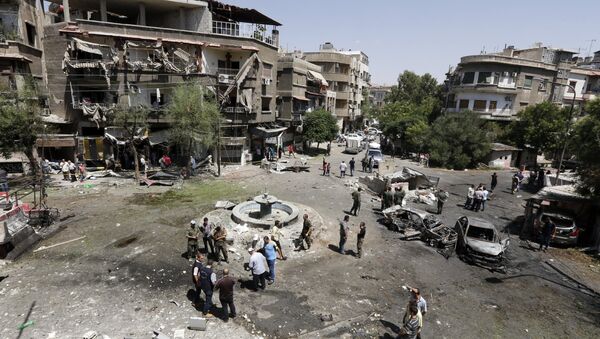Africa and the Middle East continue to grab headlines as militants carry on with deadly suicide attacks against civilian and military targets.
On Friday, a 12-year-old girl detonated a bomb in northeast Nigeria killing three boys at an Islamic seminary and a day later militants from the Jihadist group Hayat Tahrir al-Sham carried out two car bomb attacks in Aleppo targeting the forces of Syrian President Bashar al-Assad. A news outlet linked to the group, Ebaa, released a video showing the fighters of the group pledging allegiance to "death and Jihad" before they detonated themselves in Jamiyat Al Zahraa, on the western edge of Aleppo.
Dr Anat Berko, an Israeli criminologist and author of several best-selling books featuring interviews with dozens of wanna-be bombers, says the tactic has always been a powerful psychological tool.
"When you kill dozens, and in some cases hundreds, you send waves of panic among the public and create the effect of fear that paralyzes people".
A Significant Fall
The good news, says the expert, is that the number of suicide attacks has actually declined over the years. According to estimates, 2017 and 2018 saw 349 and 293 attacks respectively, whereas 2019 witnessed a drop of 49 percent in such incidents registering 149 cases.
Another blow was dealt to the former caliphate in October 2019 when its leader Abu Bakr al-Baghdadi blew himself up, preferring to die rather than be captured or killed by the US security forces that cornered him in a tunnel in the Syrian city of Idlib.
In Israel too, suicide bombings, a favourite tool of Palestinian militants in the early 2000s, have since almost vanished.
"The phenomenon disappeared almost entirely from the Israeli landscape thanks to our effective security forces coupled with intelligence and technologies that help us prevent such attacks", said Berko.
One such technology was the erection of the so-called separation barrier that stretches for more than 700 kilometres. In 2002, in the wake of the Palestinians' Second Intifada that killed more than a thousand Israelis, then-Prime Minister Ariel Sharon ordered the creation of a fence between Israel and the Palestinians in an attempt to protect the Israeli population from the ongoing terrorist threat.
Despite an uproar from human rights groups and the international community who viewed the move as a violation of Palestinians' rights, the fence was completed several years later, leading to a 50-percent drop in terrorist attacks, according to estimates by Israeli police and security forces.
"Palestinians have also realised that the tactics of exploding themselves is not working, primarily because it hurts their image on the global arena, portraying them as troublemakers rather than peace seekers".
Terrorism is Here to Stay
Yet, despite the waning popularity, it is way too soon to say these tactics are a thing of the past, believes the expert, simply because "the motivation is still there".
So is the desire of religious clerics to send their people to suicide missions, says the criminologist. "The act of taking one's life - including your own - is forbidden in all religions and yet they manage to sell this to dozens of men, women, and children by glorifying the mission and turning it into self-sacrifice that automatically makes it permissible to kill".
But the international community is not "powerless" in the face of these challenges, believes the Israeli criminologist, adding that in order for the world to be able to tackle the threat, it needs to join forces and introduce effective measures that would deter potential perpetrators.
"In Israel, for example, a wanna-be bomber gets two to three years in jail. This is simply not enough especially if you compare it to the damage their action could have caused if it wasn't aborted on time".
And it needs the support of Muslim clerics too. "If there is a fatwa [a religious ruling] forbidding violence and terrorism, the phenomenon will cease to exist. The trick is that it needs to be issued by a recognised and a renowned Muslim scholar".
In 2018, another attempt was made - this time by 70 Muslim scholars from Pakistan, Afghanistan, and Indonesia, who stated that extremism violated the principles of Islam. But their names were not big enough to be able to make an overhaul.
"That's why, despite the decline, I still believe that suicide missions will continue to be used by terrorists around the world. Their numbers might decrease but the phenomenon won't vanish", Berko summed up.
*Daesh (also known as ISIS/ISIL/IS) is a terrorist group banned in Russia





